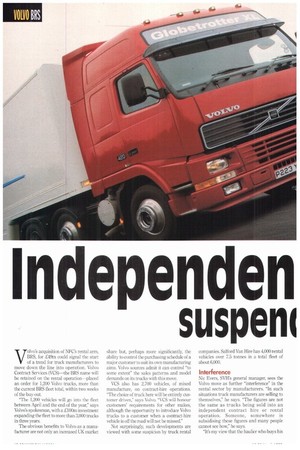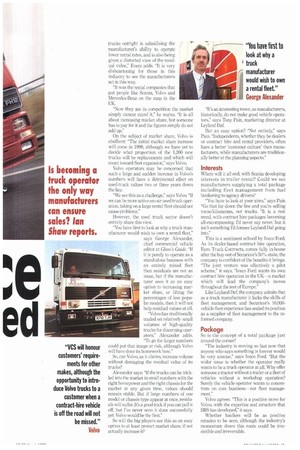nde p enden V olvo's acquisition of NFC's rental arm, BRS, for £49m
Page 64

Page 65

If you've noticed an error in this article please click here to report it so we can fix it.
could signal the start of a trend for truck manufacturers to move down the line into operation. Volvo Contract Services (VCS)—the BRS name will be retained on the rental operation—placed an order for 1,200 Volvo trucks, more than the current BRS fleet tOtal, within two weeks of the buy-out
The 1200, vehicles will go into the fleet between April and the end of the year," says Volvo's spokesman, with a .C100m investment expanding the fleet to more than 3,000 trucks in three years.
The obvious benefits to Volvo as a manufacturer are not only an increased UK market share but, perhaps more significantly, the ability to control the purchasing schedule of a major customer to suit its own manufacturing aims. Volvo sources admit it can control "to some extent" the sales patterns and model demands on its trucks with this move.
VCS also has 2,700 vehicles, of mixed manufacture, on contract-hire operations. "The choice of truck here will be entirely customer driven," says Volvo, "VCS will honour customers' requirements for other makes, although the opportunity to introduce Volvo trucks to a customer when a contract-hire vehicle is off the road will not be missed."
Not surprisingly, such developments are viewed with some suspicion by truck rental companies. Salford Van Hire has 4,000 rental vehicles over 7.5 tonnes in a total fleet of about 6,000.
Interference
Nic Evers, SVH's general manager, sees the Volvo move as further "interference" in the rental sector by manufacturers. "In such situations truck manufacturers are selling to themselves," he says. "The figures are not the same as trucks being sold into an independent contract hire or rental operation. Someone, somewhere is subsidising these figures and many people cannot see how: he says.
"It's my view that the haulier who buys his trucks outright is subsidising the manufacturer's ability to operate lower rental rates, and is also being given a distorted view of the residual value," Evers adds. "It is very disheartening for those in this industry to see the manufacturers act in this way "It was the rental companies that put people like Scania, Volvo and Mercedes-Benz on the map in the UK.
"Now they are in competition the market simply cannot stand it," he warns. "It is all about increasing market share, but someone has to pay for it and the figures simply do not add up."
On the subject of market share, Volvo is ebullient: "The initial market share increase will conic in 1998, although we have yet to decide what proportion of the 1,200 new trucks will be replacements and which will count toward fleet expansion," says Volvo.
Volvo operators may be concerned that such a large and sudden increase in Volvo's numbers will have a detrimental effect on used-truck values two or three years down the line.
"We see this as a challenge," says Volvo, "If we can be more active on our used truck operation, taking on a large rental fleet should not cause problems."
However, the used truck sector doesn't entirely share this view.
"You have first to look at why a truck manufacturer would wish to own a rental fleet," says George Alexander, chief commercial vehicle editor at Glass's Guide. "If it is purely to operate as a stand-alone business with an entirely mixed fleet then residuals are not an issue, but if the manufacturer sees it as an easy option to increasing market share, or lifting the percentages of less popular models, then it will not help residual values at all.
"Volvo has traditionally traded on relatively small volumes of high-quality trucks for discerning operators," Alexander adds. "To go for larger numbers could put that image at risk, although Volvo will have done its homework here."
So, can Volvo, as it claims, increase volume without damaging the residual value of its trucks?
Alexander says: "If the trucks can be trickled into the market in small numbers with the right horsepower and the right chassis for the market at any given time, values should remain stable. But if large numbers of one model or chassis type appear at once, residuals will suffer. It's a good trick if you can pull it off, but I've never seen it done successfully yet. Volvo would be the first."
So will the big players see this as an easy option to at least protect market share, if not actually increase it? "It's an interesting move, as manufacturers, historically, do not make good vehicle operators," says Tony Pain, marketing director at Leyland Dal But an easy option? "Not entirety," says Pain. "Independents, whether they be dealers or contract hire and rental providers, often have a better 'customer culture' than manufacturers, while manufacturers are traditionally better at the planning aspects."
Interests
Where will it all end, with Scania developing interests in trailer rental? Could we see manufacturers supplying a total package including fleet management from fuel bunkering to agency drivers?
"You have to look at your aims," says Pain "Go that far down the line and you're selling tonne/kilometres, not trucks. "It is a real trend, with contract hire packages becoming all-encompassing. I'd never say never, but it isn't something I'd foresee Leyland-Daf going into."
This is a sentiment echoed by Iveco Ford. As its dealer-based contract hire operation, Euro Truck Contracts, comes fully in-house after the buy-out of Securicor's 50% stake, the company is confident of the benefits it brings, "The joint venture was effectively a pilot scheme," it says. "Iveco Ford wants its own contract hire operation in the UK—a market which will lead the company's moves throughout the rest of Europe."
Like Leyland Daf, the company admits that as a truck manufacturer it lacks the skills of fleet management, and Securicor's 10,000vehicle fleet experience has sealed its position as a supplier of fleet management to the reformed company.
Package
So is the concept of a total package just around the corner?
"The industry is moving so fast now that anyone who says something is forever would be very unwise," says Nee° Ford, "But the wider issue is whether the operator really wants to be a truck operator at all. Why offer someone a tractor without a trailer or a fleet of vehicles without a workshop operation? Surely the vehicle operator wants to concentrate on core business—not fleet management."
Volvo agrees. "This is a positive move for Volvo, with the expertise and structure that BRS has developed," it says.
Whether hauliers will be as positive remains to be seen, although the industry's momentum down this route could be irresistible and irreversible.




























































































































